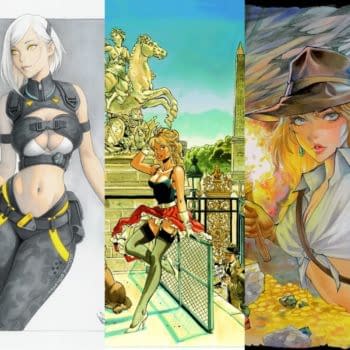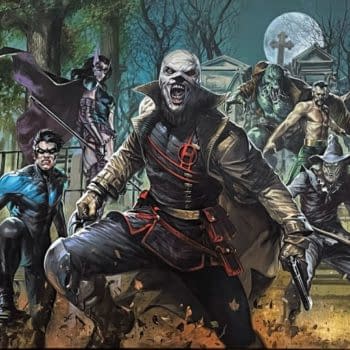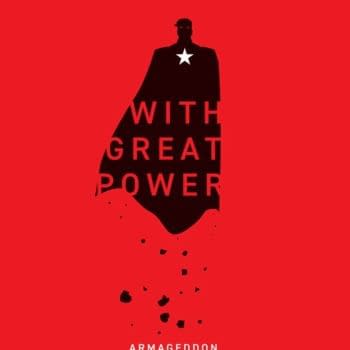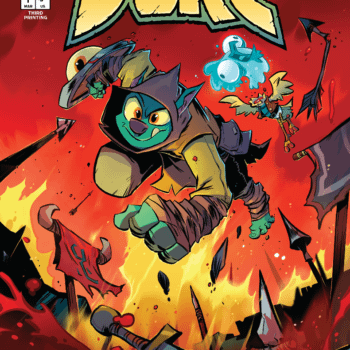Posted in: Comics | Tagged: alex de campi, carla speed mcneil, Comics, comics review, dark horse, entertainment, Francesco Francavilla, Grindhouse Doors Open At Midnight, Prison Ship Antares, Simon Fraser, Victoria Lau
This Week's Dose Of Nudity, Violence, and Exploitation From Alex de Campi and Simon Fraser

So, what does it mean when a voice for girl power in comics writes a grindhouse comic series that jumps in and splashes around in exploitation traditions, contains plenty of female nudity and violence against (and by) women? On a superficial level, it's confusing. But when you read the comics, much less so. Any single conflict scene, lifted from the series and placed in a mainstream superhero or genre comic, would raise eyebrows. Within the context of the grindhouse tradition of exploitation cinema, the scenes skew very differently. It's kind of like when oppressed groups take on and repossess the language of slurs commonly leveled against them to divest them of power. Kind of.
But to say that these comics are a social treatise would be a big disservice. These are entertaining comics, and they are especially, due to the excessive nature of their inspiration, meant to be fun. Shocking and fun. But that's where at least a tinge of genius resides. Not only co-opting taboo visual language but moving through it to energy and an adventurous spirit? That is quite an undertaking, and won't please all readers. That is, after all, the definition of pushing the envelope.

Artist Simon Fraser, of 2000AD, Nikolai Dante, and his creator-owned comic Lilly Mackenzie, is well out of his normal wheelhouse on this comic arc, and yet, he's a shockingly apt person for the job. There are a number of reasons why this might be so, attempting to extrapolate possibilities based on these results. One reason would be that learning to draw short comics in the British anthology magazine tradition made Fraser finely honed when it came to expressing big sci-fi elements without losing a single panel of character focus. Another could be that his work on creator-owned webcomics taught him an even more streamlined use of individual panels.
I'll add to that the fact that Fraser's webcomic Lily Mackenzie features a powerful heroine, a female lead, and so his handling of action scenes depicting women is not going to be simply a rendering of male fighting styles in female form. Of the possible sub-genres that Fraser might have ended up drawing for the Grindhouse series, "Prison Ship Antares" was, in fact, the perfect allocation for his skills.
But let's talk about the story and what the de Campi/Fraser team, with Victoria Lau joining Fraser on colors, accomplishes. It opens with humor, and a commentary on gender. In tarot-card like exposition, we learn of the history of man attempting to reach for the stars, and then, of course, the people heading for a distant planet aren't men at all, but women, suggesting that women are more pioneering than men. And yet the book also opens with a double-page shower scene that even in a temperate light is exhibitionist, in a more critical light, voyeuristic.
That's when you remember that you're reading a grindhouse comic and the rules of that comic are falling into operation. What the comic contains is actually going to be far more shocking and unsettling than voyeurism. It's a study in cruelty, in loyalty, and though the phrase is overused in touting entertainment—in the human spirit. Those elements are not essential to the grindhouse entertainment tradition, though they certainly aren't excluded from the genre. This is what de Campi and Fraser bring to the table, suggesting a raison de etre for the series. A comic can be spectacle-laden, excessive, even obsessive, and yet mean something about oppression and human nature.
We're only able to assess the first issue of "Prison Ship Antares" right now, but from all appearances, this is going to be a powerful mini-epic. It sets up the position of Kalinka, the sadistic prison-ship warden, the gruesome suffering she inflicts on prisoners with her twisted "sin" expulsion exemplars, and the role of her empty-headed clone guards. It sets up the uneasy alliances of female criminals expelled from their homeworld because it is convenient, being used more or less as human guinea pigs to colonize a new world far away. It sets up a belief among the prisoners that they can, potentially, do something about their situation. Maybe. But that belief itself is a powerful thing.
Sympathy definitely lies with the prisoners as we see the arbitrary way in which they are tortured and treated for being labeled deviants. There's plenty of brashness about their nudity and violence. There may even be a truer rendering of Amazon motifs here than we see in the likes of Wonder Woman. And yet, thankfully, they aren't quite idealized as avenging feminist angels. They are people who happen to be women whose gender is being exploited just as their humanity is being exploited.
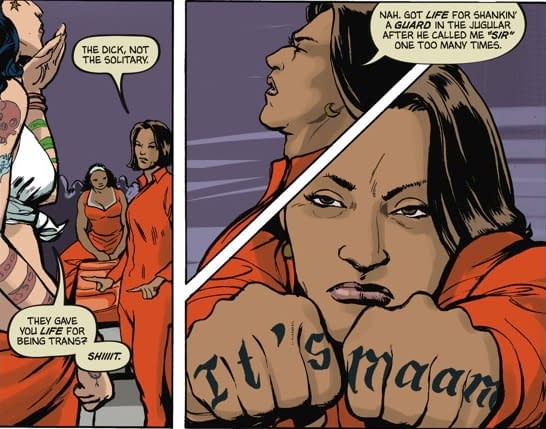
And it's grindhouse, very much so. It is, in fact, a re-imagining of the grindhouse genre in a playful, self-aware way. It takes the language of exploitation and dares the reader to see only that aspect of things, almost mocking them if they fail to find more. "Prison Ship Antares" will get under your skin because it's been designed to do that, and that shows an impressive forethought and awareness of the potential of the genre from de Campi and Fraser. Chalk one point up, at least, to interesting people doing interesting things in comics.
Hannah Means-Shannon is Senior New York Correspondent at Bleeding Cool, writes and blogs about comics for TRIP CITY and Sequart.org, and is currently working on books about Neil Gaiman and Alan Moore for Sequart. She is @hannahmenzies on Twitter and hannahmenziesblog on WordPress. Find her bio here.















